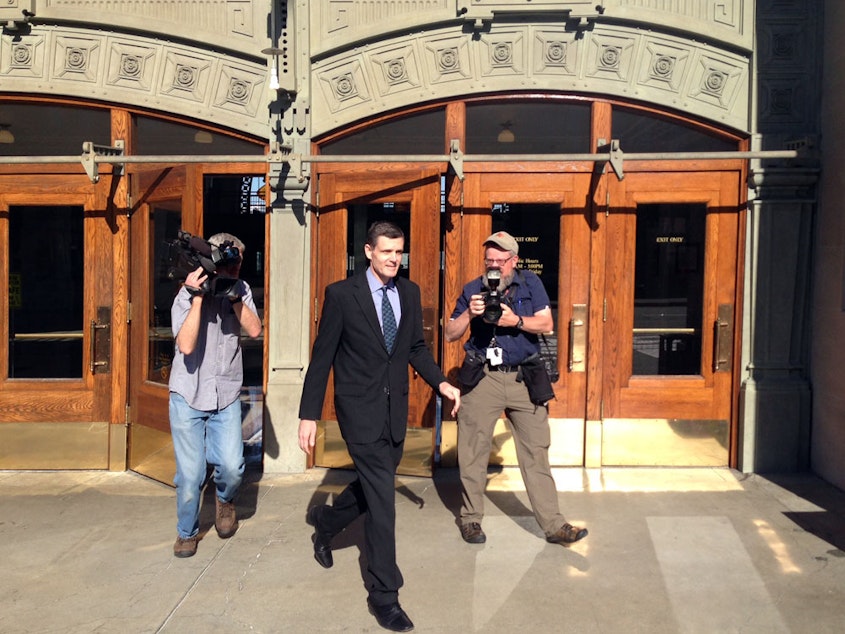Troy Kelley will remain free while Ninth Circuit mulls appeal

Former Washington state Auditor Troy Kelley will remain free on bail while he appeals his conviction for possession of stolen funds, making false statements and filing false tax returns.
Kelley was never jailed following his indictment in April 2015 and has remained free since his conviction and sentencing. He's appealing his conviction on the grounds that he could not have stolen money that escrow customers “willingly paid to him as a fee-for-service.”
In a two-page order Friday, a two-judge panel of the Ninth Court of Appeals found that Kelley does not pose a flight risk, is not a danger to the community and that his appeal “raises a ‘substantial question’ of law or fact that is fairly debatable.”
“The Ninth Circuit is basically saying Troy has raised a real issue about whether or not it could reasonably be said that he has stolen any money from anybody,” said Angelo Calfo, Kelley’s attorney. “And that’s the basis for allowing him to have bail pending appeal.”
The U.S. Attorney’s Office in Seattle did not have an immediate response to the order, but in a court filing earlier this month wrote that Kelley’s appeal is “frivolous … in a case where the evidence of guilt was overwhelming.”
Kelley was convicted last December of illegally pocketing millions of dollars in fees that he should have refunded to escrow company customers. He was also convicted of making false declarations in a civil deposition and filing false tax returns. In June, he was sentenced to a year in prison.
The case against Kelley stemmed from his work in the real estate services industry during the height of the pre-recession housing bubble before he was elected state auditor in 2012. He served one term and did not run for re-election following his indictment. Prior to being elected auditor, Kelley served as a Democratic state lawmaker from Tacoma.
Kelley’s first trial in 2016 ended with the jury acquitting him of lying to an IRS agent, but deadlocking on all other counts. Kelley was retried beginning in November 2017 after rejecting a pair of plea offers from federal prosecutors that would have allowed him to avoid a second trial.
But Kelley is arguing in court that his escrow customers paid him voluntarily.
“The customers got exactly what they paid for,” Calfo, Kelley's attorney, wrote in his motion for bail pending appeal. “The government’s argument that Mr. Kelley somehow stole from them simply makes no sense.”
In arguing against bail pending appeal, prosecutors argued that even if escrow customers willingly paid Kelley the fees as part of their closing costs, it wasn’t his money to keep.
“In sum, there was extensive evidence that Kelley stole money that belonged to another — first, by lying to get that money, and, second, by funneling it to a secret account rather than refunding it to the borrowers as he was required to do,” they wrote in response to Kelley’s motion for bail.
According to Doug Keller, a federal public defender in San Diego who wrote a 2008 law review article on post-conviction bail, the Ninth Circuit has a lower bar than other circuits for granting bail during an appeal, but it’s also not common.
“This isn’t a super high standard, [but] as a practical matter the Ninth Circuit doesn’t often grant bail pending appeal,” said Keller. “It’s basically a preliminary determination that a person’s raised something that they might win on.”
The appeals process could take 18 to 24 months or longer, according to Calfo.
If Kelley was ultimately to prevail, his convictions could be overturned or he could be granted a new trial, according to the Ninth Circuit order. [Copyright 2018 Northwest News Network]

